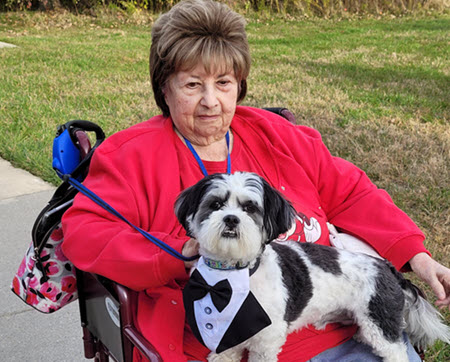Recently, I had a conversation with Rosanne Corcoran, past caregiver for her mom and host of Daughterhood the Podcast. Rosanne lost her mom about a year before I did and, like me, is still struggling with grief and trying to answer the questions every caregiver faces at the end of our journey. “What is my purpose? What am I good for now?”
During our dinner, Rosann looked at me and said, “I just feel blah.” I looked at her and said, “You too? I know what you mean. No highs, no lows, just flat.” We didn’t explore the topic any further, but I have not been able to get it out of my mind.
I don’t know if feeling flat is part of the grief process, part of struggling with a new purpose in life or simply something that happens as we age and are faced with reconstructing our life.
Certainly turning 66 is part of it. But when I reflect on my work and how supportive my mother was of it, I remember that sometimes you have to push yourself out of your comfort zone. You have to be open to trying and stepping out on a limb. So, this year I plan on writing my third book.
The working title is “I’m only leaving this house feet first.” Something mom said for years to both dad and me. I suspect that many other elders have said the same thing or a variation of it to their families.
But you can’t know what life will throw your way and when caregiving started to affect my health, mom agreed to move out of our family home and into Assisted Living (AL) close to where I live. Mom and I both learned a lot from this part of our journey and I want to share what brought us to the move and what we learned once she was living there.
One of the truths is that your caregiving job does not end. In fact, in some ways it gets more complicated. You are not managing just one person, now you are managing six: the executive director, the activities, food, nursing and caregiving directors along with maintenance. The continuation of your caregiving responsibilities after your elder moves into an AL may come as a surprise to some folks but you had best be prepared. Your presence in their life as an advocate is needed more than ever.
I knew I was handling mom’s transition into her Assisted Living like a champ with this interaction. One of the directors was in mom’s room and I suddenly realized that I had not put my name tag on. When I mentioned it, she said, “Oh, don’t worry Deb, we all know who you are.”
Disclaimer: The material in this blog is for educational purposes only. It is not intended to replace, nor does it replace, consulting with a physician, lawyer, accountant, financial planner or other qualified professional.
Deb is the author of “Your Caregiver Relationship Contract and “A Relationship Contract for Dementia Caregivers.” Your Caregiver Relationship Contract is available in both English and Spanish. It explains how to have an intentional conversation and the how unspoken expectations can cause problems during caregiving. A Relationship Contract for Dementia Caregivers explains how important it is to learn how your person wants to live their life out and how you, the caregiver are the most important person in this relationship, giving you tips and tricks for this journey.
Click here to learn more about Your Caregiver Relationship Contract or here for the Spanish version: Su Contrato de relación como cuidador de un ser querido. Click here to learn more about A Relationship Contract for Dementia Caregivers.
Deb is available as a caregiver consultant. She will answer the question: “Where do I start?” and find the resources to alleviate your stress. If you would like to invest a half hour to learn how she can help you, please contact her at: Free 30 minute consulting call

